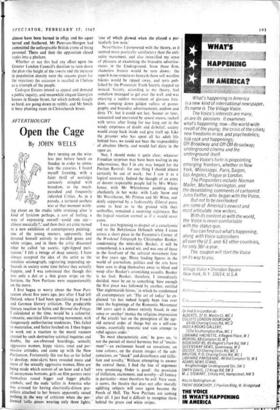Open the Cage
AFTERTHOUGHT IDLY turning on the wire- less just before lunch on Sunday in order to stimu- late the canaries. I found myself listening, with a faint thrill of nostalgia curiously mingled with boredom, to the much- parodied and frequently ridiculed Critics. As in a parody, a tortured aesthete was at that moment writh- ing about on the studio table straining after 'a kind of lyricism perhaps, a sort of feeling, a way of expressing oneself--could one say— almost musically?,' and then their art critic turned to a new exhibition of contemporary painting: one of the young masters, apparently. had devoted himself entirely to parallel green and white stripes, and in them the critic discerned what he called 'an ascetic, tight-lipped puri- tanism.' I felt a twinge of deep anxiety. I have always accepted the idea of the artist as the sensitive seismograph, registering impending up- heavals in society some time before they actually happen, and I was convinced that though this was only a dot or a thin green stripe on the horizon, the New Puritans were unquestionably on the move.
I first began to worry about the New Puri- tanism about five years ago, just after I had left Oxford, where I had been specialising in French and German literary criticism. The predictable literary reaction to Satire and Beyond the Fringe, I calculated at the time, would be a colourful, romantic, uncritical life-asserting movement, with dangerously authoritarian tendencies. This failed to materialise, and Satire lurched on. I then began to work out a reaction to the moral vacuum created by such destructive satirical inquiries and doubts, the sex-obsessed hoardings, sexually aggressive women, hippy vicars, smut and per- missive attitudes, and came up with the New Puritanism. Fortunately this too has so far failed to develop; mini-skirts have revealed more and more of the sexually aggressive women, films are being made which consist of an hour and a half of anonymous bottoms, girls on film posters twist themselves round bigger and bigger phallic symbols, and the nude 'cellist in America who was arrested for having electrically-driven pro- pellors attached to her breasts apparently raised nothing in the way of criticism when she per- formed 'cello pieces wearing only three lights, 'one of which glowed when she played a par- ticularly low note:
Nevertheless I persevered with the theory, as it seemed more poetically satisfactory than the anti- satire movement, and also intensified my sense of pleasure at examining the brassiere advertise- ments in the Underground. Soon those firm, shameless breasts would be torn down: the superb bone-structures beneath those soft woollen bikinis would be ripped away. and texts pub- lished by the Protestant Truth Society slapped up instead. Society, according to my theory, had somehow managed to get over the wall, and was enjoying a sudden movement of glorious free- dom. romping down golden valleys of porno- graphy and brassiere advertisements, nudism and dirty TV. but it could not last. Sooner or later. nauseated and enervated by sexual excess, racked with terror after living for too long out in the windy emptiness of doubt and disbelief. society would creep back inside and give itself up. Like the prisoner who has spent all his adult life behind bars, we could not bear the responsibility of absolute liberty, and would feel dizzy in the open air.
Not, I should make it quite clear, whatever Freudian surprises may have been waiting in my subconscious, that I in any way longed for the Puritan Revival: for one thing I should almost certainly be out of work: but I saw it as a logical necessity. Indeed the thought of an army of decent respectable people led by Mrs White- house, with Mr Whitehouse padding along obediently in her wake. with Lady Snow and Mr Worsthorne, Mr Pitman and Mr Winn, sud- denly supported by a fashionably illiberal press. come to beat us to the ground with their umbrellas, remained a recurring nightmare. But the logical reaction seemed as if it would never come.
I was just beginning to despair of a cataclysmic end to the Babylonian Debauch when I came across a short piece in the Eccentric's Corner of the Weekend Telegraph by Christopher Booker, condemning the mini-skirt. Booker, it will be remembered, is a noted wit, and was one of those in the forefront of the satirical movement four 'or five years ago. Many leading figures in the world of journalism, politics and the arts have been seen to drag themselves away to bleed and weep after Booker's astonishing assaults. Booker is no fool. Booker, therefore, I immediately decided, must be on to something. Sure enough the first piece was followed by another, entitled 'Our nightmarish hiatus, in which he condemned all contemporary art. 'The art of today' he ex- plained '(as has indeed largely been true ever since the beginnings of the Romantic Movement 160 years ago) is almost entirely based, in one sense or another' (notice the religious imprecision of the attack) 'not on the perception of the age- old natural order of things but on a self-con- scious, essentially neurotic and vain attempt to rebel against order.'
'Its most characteristic aim,' he goes on, 'is not the pursuit of moral harmony but of "excite- ment"—an excitement based on sensations, on tone colours, on the dream images of the sub- conscious, on "shock" and disturbance and titilla- tion and novelty.' Without attempting to answer the central thesis, I find the line of argument very promising. Order is good: the provision of titillation, excitement, and novelty—all fantasy in particular—must therefore be evil. Very soon, it seems, the theatre that does not offer morally uplifting subjects will once again become the Porch of Hell. The New Puritans are coming after all. I just find it difficult to recognise them behind the green and white stripes.





























 Previous page
Previous page